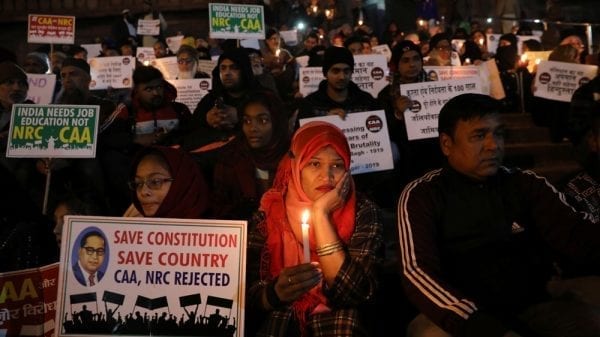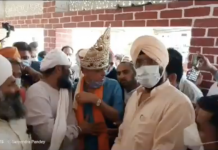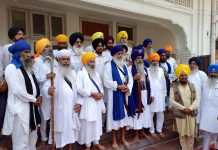The BJP led Indian government had made an amendment to the Citizenship Act -1955 on December 11 last year to help six religious minorities facing persecution or fear of persecution in three Islamic countries Afghanistan, Pakistan and Bangladesh. The six minorities include Hindu, Sikh, Buddhist, Jain, Parsi, and Christian. CAA left behind Muslims who are minorities in India but a majority in Afghanistan, Pakistan and Bangladesh.
The Indian government faced a lot of opposition internally as well as externally for compromising with the secular ethics of the Indian constitution by keeping aside a particular religion in this contentious act.
This opposition ultimately led to communal marginalization in India followed by “riots” in Delhi.
Amid this communal marginalization, the Sikh community stood in the back of Muslims by serving langar to the Muslim protesting against CAA + NRC at Shaheen Bagh and openly joining their struggle. All these activities of Sikhs irked the Hindu elements a lot who stand by the legal mesh of CAA+NRC to target Muslims.
These radical Hindu elements started depicting their true colors on social media as soon as the news of the suicidal attack on Afghan Sikhs started surfacing over news portals. Even, BJP parliamentarian Kapil Mishra didn’t refrain from openly trolling the Sikhs for opposing the CAA and serving langar at Shaheen Bagh.
Now, this trolling has become a trend among a large section of the Hindu community and the Sikhs are being cursed for not supporting the CAA.
An impression is being created that the CAA can help Afghan Sikhs in their rehabilitation in India.
In this situation, it becomes necessary to have a thorough insight into the provisions of the Citizenship Amendment Act-2019 to know whether the CAA can really help Afghan Sikhs being persecuted in 2020.
The amendment made to Section 2 of Citizenship Act-1955 reads as:
“Provided that any person belonging to Hindu, Sikh, Buddhist, Jain, Parsi or Christian community from Afghanistan, Bangladesh or Pakistan, who entered into India on or before the 31st day of December 2014 and who has been exempted by the Central Government by or under clause (c) of sub-section (2) of section 3 of the Passport (Entry into India) Act, 1920 or from the application of the provisions of the Foreigners Act, 1946 or any rule or order made thereunder, shall not be treated as illegal migrant for the purposes of this Act.”
This amendment clarifies that only those persons belonging to Hindu, Sikh, Buddhist, Jain, Parsi or Christian community will be considered for citizenship who entered India on or before December 31, 2014.
This amendment also tends to pass this benefit to those who have been exempted by the Central Government by or under clause (c) of sub-section (2) of section 3 of the Passport (Entry into India) Act. Now, let’s read what this clause (c) of sub-section (2) of section 3 of the Passport (Entry into India) Act says:
“…provide for the exemption, either absolutely or on any condition, of any person or class of persons from any provision of such rules.”
So, this provision only speaks of those persons who were allowed to enter India without a passport. It doesn’t specify whether this provision will be applicable to those entering India in 2020.
The CAA also talks of the various provisions of Foreigners Act, 1946 to legitimate the presence of a foreigner in India, but we should not forget here that the Foreigners Act only allows government to legalize presence of foreigners through various means other than citizenship.
To conclude, Afghan Sikhs who will enter India in 2020, will not have any scope to get citizenship under CAA until unless the Indian government extends the date of entry required to be a beneficiary under this act by making another amendment in Section 2 of the Citizenship Act.






Leaving apart what idiotic ideology is of hard liners hindus, some of us still support CAA. Reason being when muslims of pakistan have exercised their will to create a separate land, did unjust things and atrocities on non muslims during creation of pakistan, why they should now be allowed to settle in India? Once they have decided forcefully to settle in pakistan, why do now opportunity be given them to settle back in India?
They need that part of land also, they need this part of land also and where the hell non Muslims will go then?
Do Pakistani muslims ever raised voiced over rights of Sikhs in land that is now Pakistan? Agreed that they provided access only to handful of Gurudwaras, what about thousands of other sites? Even if they are restored, where will they get sangat from which was already uprooted from their home in 1947 ?
Partition is a settled case now and so is citizenship. They have chosen their choice of land which was wet with blood of innocents. This choice of citizenship can not be provided at will to some (muslims) while ignoring rights of others (non muslims)
Those Hindu dolts making noise against the Sikhs are uneducated and ignorant. However the question I wish to pose here is, I’d the CAA is indeed such a toothless tool and only extends its gambit to the ~31,000 refugees in India from the 3 designated countries… why so much of noise ? Doesn’t that clearly outlines the gaping holes within the Shaheen Baag strategy?
bhul chuk muaf but i have to support india vs hateful musalman>>https://youtu.be/5XFPFn8j8XQ